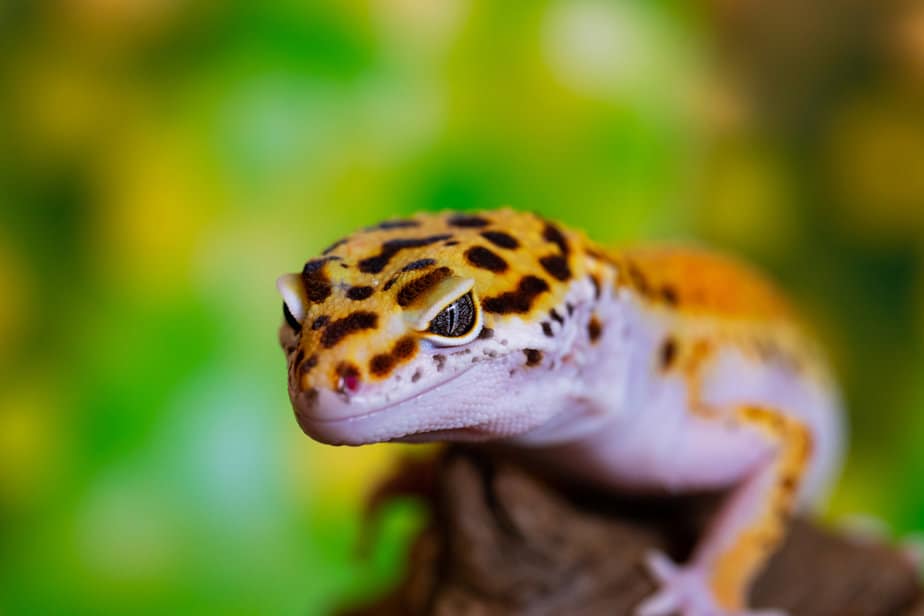Leopard geckos are one of the most popular pets among reptile lovers. This is because they are quiet, gentle, and easy to care for. But do these cute reptiles carry Salmonella?
Unfortunately, leopard geckos and many other reptiles often carry Salmonella. To make matters worse, you can’t definitively tell which reptile carries Salmonella and which one doesn’t. Even leopard geckos who look healthy may carry this bacteria.

What is Salmonella?
Salmonella is a bacterial infection that usually affects the intestinal tract. So when you’re infected with this bacteria, it will live in your intestines and come out with your feces.
The major symptoms of Salmonella in humans include fever, nausea, vomiting, abdominal cramps, and diarrhea. These symptoms usually show up 8 to 72 hours after you’ve been exposed to the bacteria.
Fortunately, if you’re healthy, you’ll probably recover within a few days without any treatment.
If the disease continues for longer, you can get dehydrated, see blood in your stool, get a high fever and develop other complications. If you notice any of these symptoms, you need to go see a doctor immediately.
Things can get particularly dire if the infection spreads out of your intestines to other parts of your body. Interestingly, some Salmonella strains can even lead to typhoid fever.
While most people get Salmonella from ingesting contaminated water/food, you can also get this disease from infected surfaces and pets.
Can you get Salmonella from your leopard gecko?
According to the Centers for Disease Control and Prevention (CDC), humans can get Salmonella from geckos and other reptiles. Several Salmonella outbreaks in the United States have been linked to contact with geckos.
People who are especially at risk for Salmonella infection include children under the age of 5, adults older than 65 years of age, and those with a weakened immune system.
How to avoid getting Salmonella from your leopard gecko
Even if your leopard gecko carries Salmonella, there are some things you can do to protect yourself from infection. These include:
Washing your hands after handling
Even if you only handle your leopard gecko for a few minutes, ensure that you wash your hands immediately after.
This is particularly important if you usually take care of a baby, toddler, elderly parent, or sick person. Also, remember not to bite your nails or put your fingers in your mouth immediately after handling your gecko.
Beyond that, ensure that any child who owns a leopard gecko washes their hands after they handle it. If you don’t trust the child, religiously supervise the child as they wash their hands.
Another thing you have to keep in mind is that your leopard gecko’s food and things may also contain Salmonella. So ensure you wash your hands after touching these as well.
Don’t let at-risk people keep leopard geckos
If you have an at-risk person living in your household, don’t allow them to keep a leopard gecko. They can easily get Salmonella and even experience more severe symptoms than you would have if you got it.
Keep your leopard gecko away from the kitchen
Taking your leopard gecko and its things to the kitchen and any other part of your home where you handle food increases your risk of Salmonella infection.
So even when you want to wash your leopard gecko’s tank or toys, you’re better off doing it outside or in the bathroom. And if you choose to do this in the bathroom, ensure you clean it thoroughly afterward.
Don’t snuggle with your leopard gecko
No matter how lonely you get, never snuggle with your leopard gecko. Doing so can get Salmonella all over your beddings or couch. Ultimately, this increases the risk of infection.
Can you give your leopard gecko Salmonella?
One of the most annoying things about Salmonella is that you can also give it to your leopard gecko and other pets.
While Salmonella doesn’t affect reptiles and amphibians badly, it does affect mammals like cats.
It can induce symptoms like diarrhea, lethargy, weight loss, dehydration, and anorexia in such animals. Remember, Salmonella has over 2000 strains, meaning it can present differently in different animals.
What other animals carry Salmonella?
Apart from leopard geckos and other reptiles, many other animals carry Salmonella. These include:
- Cats
- Turtles
- Dogs
- Frogs
- Birds
So don’t let the risk of getting Salmonella keep you from keeping a leopard gecko – you can easily get it from your other pets. You also might want to be careful about what pets you keep with your leopard gecko.
Final thoughts
Ultimately, you are more likely to get Salmonella from contaminated food than from your leopard gecko. So don’t worry so much about it – just take the necessary precautions to keep yourself safe and enjoy your time with your pet. In time, you’ll get used to safely living with these cute reptiles.
References:
https://www.mayoclinic.org/diseases-conditions/salmonella/symptoms-causes/syc-20355329
https://www.ncbi.nlm.nih.gov/pmc/articles/PMC7497748/
https://www.cdc.gov/salmonella/muenchen-05-15/advice-pet-owners.html
